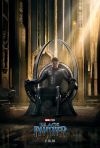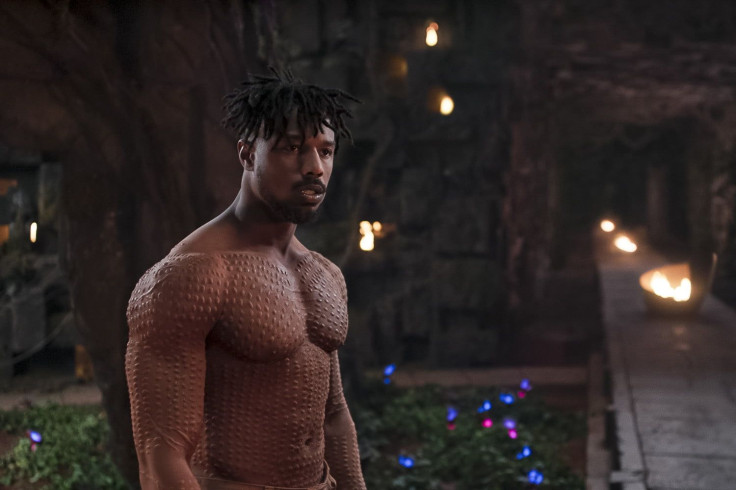Yes, there will be mild spoilers for Black Panther, but details will be more thematic than plot-based.
When tribal leader W’Kabi (Daniel Kaluuya) echoes familiar xenophobic rhetoric, arguing to Wakanda’s new king the Black Panther T’Challa (Chadwick Boseman) that allowing immigrants entry makes “their problems our problems,” the outlines of T’Challa’s character growth comes into focus. Wakanda can no longer justify its isolationism in the face of suffering, particularly that of oppressed black people worldwide. T’Challa, initially resistant to opening Wakanda up to the world, has his hand forced by Erik Killmonger (Michael B. Jordan), a Wakandan exile who correctly points out the cowardice and elitism inherent in Wakanda’s supposedly enlightened detachment. After defeating Killmonger’s more imperialist vision — exporting military revolution, toppling the world order to put the bottom on top — the Black Panther opens outreach centers in American cities and goes before the U.N. to offer Wakandan aid to the world.
There’s another immensely influential, fantastical kingdom capable of drastically reducing world suffering that hides vast resources and medical technologies. But good luck getting the same help from those selfish goddamn wizards. Black Panther does in one movie what Harry Potter, Albus Dumbledore, Newt Scamander and J.K. Rowling can’t get across in 13.
Both Black Panther and Fantastic Beasts and Where to Find Them are about powerful societies with lots to offer the world. In both, a powerful insider/outsider wants to turn a secret society’s power toward domination. In answer to Killmonger, Black Panther opens up Wakanda on peaceful terms. In answer to Grindelwald, the wizard world continues to do just what it was doing, never resolving the knot of tension created by the kernel of truth in Grindelwald’s critique that muggle society could benefit from an end to wizard secretiveness.
Until Fantastic Beasts and Where to Find Them it didn’t really matter that the wizarding world was such an exclusionary place. As an escapist portal fantasy about a boy whisked off somewhere magical, the Harry Potter movies didn’t have to bear all the world’s logic. It was easy to suspend extraneous thoughts like “you guys have magical feast powers while millions of muggles starve.” But in Fantastic Beasts Rowling tackles different and more adult societal themes, attempting to take fable seriously as geopolitics. And so you have the spectacle of an insanely rich skyscraper full of wizards portrayed as the good guys as they erase the memories of everyone in New York City or chase down and kill a poor, abused kid.
Fantastic Beasts asked the same question as Black Panther: what should be this powerful, secret community’s relationship with the world? It answers poorly. And bound by prequel continuity strictures, there’s no chance of that changing in Fantastic Beasts: The Crimes of Grindelwald or unnamed sequel three, four and five.
Blockbusters always have trouble answering for the consequences of their own fictional world, because a movie doesn’t need thematic congruity to make sense on a plot level. And when the chief concern is saving the cat or nailing the act turn or arriving efficiently at the next action scene demanded by formula, it’s easy to focus on immediate causality, no matter how much it might distort psychologically justifiable motivations or obscure an underpinning of explicable ideas about how the fictional world relates to ours.
Black Panther does an especially good job with these considerations, while Fantastic Beasts and its surrounding mega-verse does an especially bad one. This kind of deficiency often passes unnoticed on first viewing, especially if people came expecting spectacle and got it, but it is often the difference between a movie that endures and a movie that disappears from public consciousness. Its root incoherence allows it to slide from our minds.
It’s astounding that it took all the way to Black Panther for Marvel Studios to concoct a central conflict with thematic cohesion outside of the immediate logic necessary for setting up climactic fights. Past Marvel villains have been either flatly evil by nature — Ultron, Red Skull, Dormammu, Ronan, Malekith, Alexander Pierce, Ego, Aldrich Killian — or riven by compelling personal conflicts that can only be inflated to the required universal stakes by contrivance or manipulation — Zemo, Nebula, The Winter Soldier and, most successfully, Loki. But only Killmonger combines compelling personal motivations, a plan that naturally follows and a legitimate enough viewpoint to force the Black Panther to do more than fight, but also to change himself and his beliefs. That’s real magic.



















